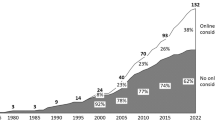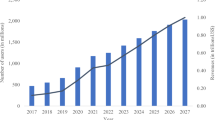Abstract
Most online markets establish reputation systems to assist in building trust between sellers and buyers. Sellers’ reputations not only provide guidelines for buyers but may also inform sellers of their optimal pricing strategy. In this research, we assumed two types of buyers – informed buyers and uninformed buyers. Informed buyers know more about the reputation of the seller but may incur a search cost. Then we developed a benchmark model and a competition model. We found that high reputation sellers and low reputation sellers adopt different pricing strategies depending on the informativeness of buyers and the competition among sellers. With a large proportion of well-informed buyers, high reputation sellers may charge a lower price than low reputation sellers, i.e., a negative price premium effect, in contrast to conclusions of some previous studies. Empirical findings were consistent with our theoretical models. We collected data on five categories of products, televisions, laptops, cosmetics, shoes, and beverages, from Taobao – a leading e-commerce market. A negative price premium effect was observed for TVs, laptops, and cosmetics; a price premium effect was observed for beverages; no significant trend was observed for shoes. We infer product value and market complexity are the main factors of buyer informativeness.



Similar content being viewed by others
Data availability
All materials and data used in the trial of this study will be available on request.
Change history
13 February 2024
This article has been retracted. Please see the Retraction Notice for more detail: https://doi.org/10.1007/s12063-024-00463-7
References
Akerlof GA (1970) The market for lemons: Quality uncertainty and the market mechanism. Q J Econ 84(3):488–500
Alessandria G (2009) Consumer search, price dispersion, and international relative price fluctuations. Int Econ Rev 50(3):803–829
Ba S, Pavlou PA (2002) Evidence of the effect of trust building technology in electronic markets: Price premiums and buyer behavior. MIS Q 26:243–268
Ba S, Stallaert J, Zhang Z (2007) Price competition in e-tailing under service and recognition differentiation. Electron Commer Res Appl 6(3):322–331
Baye MR et al (2004) Price dispersion in the small and in the large: Evidence from an internet price comparison site. J Ind Econ 52(4):463–496
Baylis K, Perloff JM (2002) Price dispersion on the Internet: Good firms and bad firms. Rev Ind Organ 21(3):305–324
Carbal L, Hortaçsu A (2010) The dynamics of seller reputation: evidence from ebay. J Ind Econ 58(1):54–78
Cao Y (2021) Retracted article: Artificial intelligence-based plant environment detection in coastal areas and B2C e-commerce network marketing. Arab J Geosci 14(11):1–17
Chen P et al (2015) Can online markets attract high-quality products? Econ Model 51:65–71. https://doi.org/10.1016/j.econmod.2015.07.010
Clay K et al (2002) Retail strategies on the web: Price and non–price competition in the online book industry. J Ind Econ 50(3):351–367
Fan S (2019) The “lemon” problem in electronic commerce and its solution. Administrative Assets and Finance 12:25–26
Filippas A et al (2022) Reputation inflation. ACM Conference on Economics and Computation. New York: ACM
Fisher F et al (2013) Inflated Dollors and Reputations. American Spectator 46:6–7
Fu R (2019) An empirical study on online and offline price mean and price dispersion in B2C market. Doctural Dissertation. South China University of Technology
Giannakas K, Fulton M (2020) On the market for Lemons: quality provision in markets with asymmetric information. Humanities and Social Sciences Communications 7(1). https://doi.org/10.1057/s41599-020-00658-w
Guo YF (2012) Price and Reputation in E-commerce Market – Based on the Analysis of Taobao.com. Chinese Price 1:46–49
Jolivet G et al (2016) Reputation and prices on the e-market: Evidence from a major french platform. Int J Ind Organ 45:59–75
Lee HG et al (2003) Is the internet making retail transactions more efficient?: Comparison of online and offline CD retail markets. Electron Commer Res Appl 2(3):266–277
Li L et al (2016) Buying reputation as a signal of quality: evidence from an online marketplace. J Econ 51(4):965–988
Li W (2019) An Empirical Study on Price Level and Price Dispersion of E-Commerce -- Taking Online Room Reservation as an Example. Doctoral Dissertation. Southwest Jiaotong University
Liu Y et al (2012) Negative price premium effect in online market—The impact of competition and buyer informativeness on the pricing strategies of sellers with different reputation levels. Decis Support Syst 54(1):681–690
Liu Y et al (2009) Pricing strategy in online retailing marketplaces of homogeneous goods: Should high reputation seller charge more? SIGeBIZ track of the Americas Conference on Information Systems. Heidelberg: Springer, pp. 155–168
Luo J et al (2018) Pricing strategies in online book industry: a comparative study. IseB 16(4):791–816
Luo W, Chung QB (2010) Retailer reputation and online pricing strategy. J Comput Inf Syst 50(4):50–56
Mahmoud MA et al (2018) The effect of trust, commitment, and conflict handling on customer retention: the mediating role of customer satisfaction. Journal of Relationship Marketing 17(4):257–276
Moscarini G, Ottaviani M (2001) Price Competition for an Informed Buyer. J Econ Theory 101(2):457–493
Peng H, Ling M (2009) Will Commodity Properties Affect Seller’s Creditworthy: Evidence in C2C E-commerce Market in China. The International Conference on Web Information Systems and Mining, pp. 535–544
Qian et al (2021) Reputation and Pricing Dynamics in Online Markets. IEEE/ACM Trans Networking 29(4):1745–1759
Salop S, Stiglitz J (1977) Bargains and ripoffs: A model of monopolistically competitive price dispersion. Rev Econ Stud 44(3):493–510
Shen L et al (2020) Impacts of online shopping convenience and physical retail proximity on housing prices in Shenzhen, 2016–2018. J Housing Built Environ 35(4):1157–1176. https://doi.org/10.1007/s10901-020-09732-w
Tadelis S (2016) Reputation and Feedback Systems in Online Platform Markets. Annu Rev Ecol 8(1):321–340
Varian HR (1980) A model of sales. Am Econ Rev 70(4):651–659
Wahab HKA, Giwah B (2020) The Effect of Celebrity Firms on Customer Commitment in E-Commerce Setting: the Mediating Roles of Trust and Identification. International Knowledge Sharing Platform 11:111–127
Wang W, Li F (2020) ’What determines online transaction price dispersion? Evidence from the Largest Online Platform in China’, Electronic Commerce Research and Applications 42:100968
Xie H, Liu JC (2017) Mining deficiencies of online reputation systems: Methodologies, experiments and implications. IEEE Trans Serv Comput 13(5):887–900
Xu M (2018) The Impact of Consumer Interaction on Consumer Trust and Purchase Intention: Based on Social E-Markets. Doctoral Dissertation. Beijing Jiaotong University
You W et al (2011) Reputation inflation detection in a Chinese C2C market. Electron Commer Res Appl 10(5):510–519
Zhang X et al (2012) Do different reputation systems provide consistent signals of seller quality: a canonical correlation investigation of Chinese C2C marketplaces. Electron Mark 22(3):155–168
Zhuang W et al (2021) Big Data Analytics in E-commerce for the US and China Through Literature Reviewing. Journal of Systems Science and Information 9(1):16–44
Funding
The authors did not receive specific funding.
Author information
Authors and Affiliations
Corresponding author
Ethics declarations
Conflicts of anterest
The authors have declared that there are no conflicts of interest.
Additional information
Publisher's Note
Springer Nature remains neutral with regard to jurisdictional claims in published maps and institutional affiliations.
This article has been retracted. Please see the retraction notice for more detail:https://doi.org/10.1007/s12063-024-00463-7
Rights and permissions
Springer Nature or its licensor (e.g. a society or other partner) holds exclusive rights to this article under a publishing agreement with the author(s) or other rightsholder(s); author self-archiving of the accepted manuscript version of this article is solely governed by the terms of such publishing agreement and applicable law.
About this article
Cite this article
Chen, Z., Zhu, Y., Shen, T. et al. RETRACTED ARTICLE: The optimal pricing strategy to evaluate the reputations of sellers in online platforms using the game theory model. Oper Manag Res 15, 953–964 (2022). https://doi.org/10.1007/s12063-022-00306-3
Received:
Revised:
Accepted:
Published:
Issue Date:
DOI: https://doi.org/10.1007/s12063-022-00306-3




